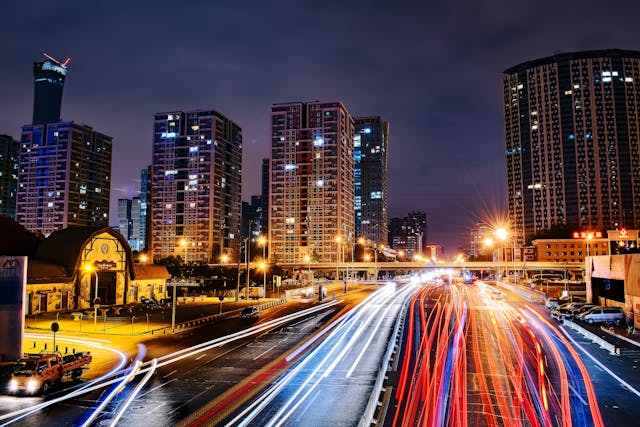99 percent of people live in areas that meet standards for light pollution, and we’ve got one person to thank for that: Thomas Alva Edison. Edison thought sleep was lazy, unhealthy, or inefficient, even though he took several naps a day. But despite that hypocrisy, his work more/sleep less view changed our world forever. Illuminating the night became a sign of economic progress, and humankind was no longer at the mercy of nature’s clock.

Artificial light can have serious effects on our sleep cycle. When we’re exposed to bright light at night, our brain doesn’t know better than to think that the sun is shining. This can be very confusing, preventing the release of melatonin and the onset of sleep. Hence we find it so difficult falling asleep.
You’ve all heard that sleep is good for you but what really happens when you get none of those recommended seven to nine hours of beauty rest? Well the results aren’t pretty, it’s a combination of tremors, hallucinations and in some extreme cases death. Turns out there’s more on the line than just a few dark circles under those eyes.
Now let’s look at some side effects that you’ll have to deal with when you don’t get enough sleep.
SIDE EFFECTS OF SLEEP DEPRIVATION
1. LEARNING ABILITY
Sleep plays a critical role in thinking and learning. Lack of sleep hurts these cognitive processes in many ways. It impairs attention, alertness, concentration, reasoning, and problem solving. This makes it more difficult to learn efficiently.

During the night, your brain is busy processing information from the day and forming memories. If you are sleep deprived, your ability to learn and retain new information may be impaired. This may not be news to anyone who has pulled an all nighter, cramming for a test only to find out that the facts and figures they knew at 2 a.m. could not be recalled the next day. To put it simply, without adequate sleep, your brain has a harder time absorbing and recalling new information.
2. OBESITY
Remarkably, sleep loss may also be a contributing factor to obesity. Firstly, it makes you too tired to get enough exercise. Secondly, you’re more inclined to over eat, as it affects two hormones that control your hunger: ghrelin and leptin. Ghrelin signals your brain that it’s time to eat. When you’re sleep deprived, your body makes more ghrelin. Leptin, on the other hand, cues your brain to put the fork down. When you’re not getting enough sleep, leptin levels fall, signaling your brain to eat more food. It’s no wonder sleep deprivation leads to overeating and extra pounds.

In fact, sleep-deprived participants in one study, ate an average of 300 calories more per day.
3. YOU MIGHT DIE EARLY
Reduced sleep time has a greater mortality risk than high blood pressure, heart disease and even smoking. They discovered that people who slept for less than six hours each night, were 12 percent more likely to die prematurely, than those who slept the recommended six to eight hours.
While you’re asleep, your body takes care of all of the regenerative jobs needed to keep it healthy. Without sleep, this regeneration process isn’t completed.
4. MENTAL HEALTH

Lack of sleep affects our mood and emotions. We become irritable and angry more easily. We can feel tearful stressed and unable to cope problems and worries may increase. Resulting in behavior difficulties, low mood, lack of motivation, lack of self-confidence and low self-esteem. The good news is that good quality sleep helps us to manage all these emotions.
5. ALZHEIMER’S DISEASE
Lack of sleep leads to an increased development of a toxic protein in the brain that is called beta amyloid. Beta amyloid is associated with Alzheimer’s disease. During deep sleep at night a sewage system within the brain actually kicks into high gear and it starts to wash away this toxic protein beta amyloid. So if you’re not getting enough sleep, each and every night more of that Alzheimer’s related protein will build up. The more protein that builds up, the greater your risk of going on to develop dementia in later life.

People with Alzheimer’s have trouble remembering things that happened recently or names of the people they know. Over time symptoms gets worse. People may not recognize their family members or may have trouble speaking, reading or writing. If you wanna know more about Alzheimer’s then check this ALZHEIMER – Causes, Symptoms and Treatment
6. IMMUNE SYSTEM
Our immune system is designed to protect us from colds, flu, and other diseases. But when it is not functioning properly, it fails to do its job. That makes you more likely to get sick and stay sick, or have a slow healing time for any injuries you may have. Immunity and its types
In 2014, a devoted soccer fan died after staying awake for 48 hours to watch the World Cup. While his untimely death was due to a stroke, studies show that chronically sleeping fewer than six hours a night increases stroke risk by four and half times compared to those getting a consistent seven to eight hours of shuteye.
After just one night of 4 to 5 hours of sleep there is a 70% reduction in critical anti cancer fighting immune cells called natural killer cells. Short sleep duration predicts your risk for developing numerous forms of cancer.

In fact the link between lack of sleep and cancer is now so strong that recently the World Health Organization decided to classify any form of nighttime shift work as a probable carcinogen.
These were some side effects of sleep deprivation or when you consistently sleep less than 6 hours . You might wonder how could sleeping less than 6-7 hours can cause such deadly effects on our body.
HOW CAN SLEEP DEPRIVATION CAUSE SUCH IMMENSE SUFFERING?
Now lets understand sleep in a very easy and non detailed manner. Human sleep patterns are controlled by two competing networks of chemical and electrical signals in the brain. During our waking hours, neurotransmitters are released deep within our brain. They keep our cerebral cortex alert and primed for consciousness. But throughout the day, as our neurons break down ATP for energy, the byproduct adenosine builds up and activates sleep control neurons near the hypothalamus. A special region in the center of our brain called pineal gland acts as our master biological clock. Light sensitive cells in our retinas feed signals deep into that brain region, training neurons to sync up with Earth’s 24 hour cycle of day and night. These circadian rhythms are the control switch that tells us when to feel sleepy or awake.

As the world goes dark, this master switch tells our pineal gland to increase levels of the hormone melatonin in the bloodstream, sort of like a chemical lullaby. Feelings of fatigue set in, body temperature lowers slightly, that heat loss is actually why many of us like to fall asleep. Together all this neurochemistry sends one clear message to our bodies: when it’s dark, it’s time to go to bed.
The answer to the above question lies with the accumulation of waste products in the brain. During our waking hours, our cells are busy using up our day’s energy sources, which get broken down into various byproducts, including adenosine. As adenosine builds up, it increases the urge to sleep, also known as sleep pressure. In fact, caffeine works by blocking adenosine’s receptor pathways. Other waste products also build up in the brain, and if they’re not cleared away, they collectively overload the brain and are thought to lead to the many negative symptoms of sleep deprivation which were mentioned in the starting of the article.
So, what’s happening in our brain when we sleep to prevent this? Scientists found something called the glymphatic system, a clean-up mechanism that removes this buildup and is much more active when we’re asleep. It works by using cerebrospinal fluid to flush away toxic byproducts that accumulate between cells. It was one perspective, if you wanna know in detail what our brain does while we are sleeping you should check this article
CONCLUSION

One of the biggest problems with lack of sleep is that people don’t even know they are sleep deprived. It’s estimated that 30% of adults and 66% of adolescents are regularly sleep-deprived. Studies show that over time, people who are getting five hours of sleep, instead of seven or eight, begin to feel that they have adapted and got used to this sleep pattern. But if you look closely at how they actually do on tests of mental alertness and performance, they are functioning on a sub-par level. This isn’t just a minor inconvenience. Staying awake can cause serious bodily harm.
You will be amazed to know that on January 8, 1964, Randy Gardner, 17 years old, has gone without sleep for eleven days. If you wanna know how he did it and what were the effects after, You should have a look at this article HOW LONG CAN YOU GO WITHOUT SLEEP ?
For more such article do check out our website medicoved.com
Author : Dr. Easminara Shaikh


